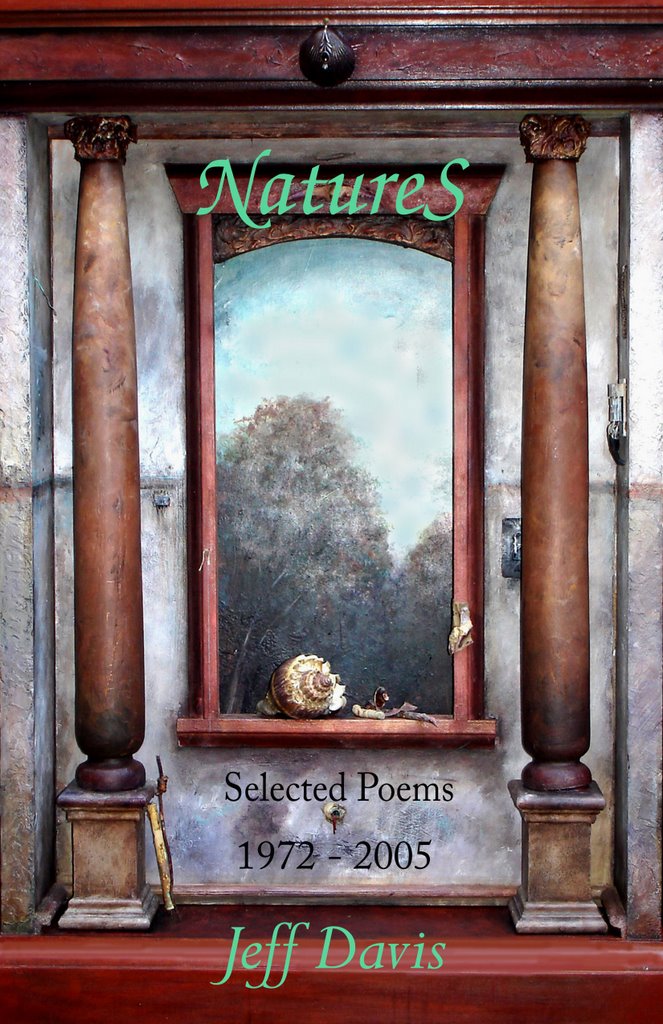
Jonathan Williams, one of this country's literary treasures, died last night in Highlands from complications of a systemic infection. He had been ill for some time, and had been receiving treatment for peripheral neuropathy for the last several years. As Ron Silliman
notes today, Jonathan was the last survivor of the Black Mountain poets featured in Donald Allen's 1962
New American Poetry; fortunately, other Black Mountain writers not included in that anthology, notably Michael Rumaker, still flourish.
Jonathan was an extraordinary poet, of course, and perhaps equally remarkable as a publisher (his
Jargon Press was one of the absolutely critical undertakings in American poetry of the last sixty years) and a photographer. He also was a long time collector of vernacular art, and a show from his collection, curated by Tom Patterson, is currently
up at the Turchin Center for the Visual Arts in Boone, North Carolina. It runs until June, for those who'd like to get a glimpse of work that caught Colonel Williams' eye.
Jonathan was generous with his time and attention, and proved gracious and amiable host when I asked in 2005 if I might interview him about his career and work. The afternoon at Skywinding, Jonathan and Tom Meyer's home, was an illuminating feast of insight, history, and the various delights of imagination - and Tom made one of the best lasagne's I've ever had, to boot. Jonathan gave a few readings here in Western North Carolina after the publication of
Jubilant Thicket, his selected poems (Silliman: "one of those absolute must-have books of poetry"), and I managed to record one of those, at City Lights Books in Sylva, as well. I'll be listening to those recordings this week, and putting together a memorial show for this coming Sunday's
Wordplay.
Jonathan was probably best known for his humorous work, and he did humor well - a rare talent these days. In the course of his long career (I almost wrote "careen"; he moved right along), though, he explored many territories of poetry, from the visual (see the original edition of
Blues & Roots/Rue & Bluets), through the procedural (portions of 1964's
Mahler were composed by using a "Hallucinatory Deck", "a personal alchemical deck of 55 white cards on which are written 110 words, - the private and most meaningful words of my poetic vocabulary"), to the poem of found or discovered language. One of my favorites, though, is one of his more conventional poems ("conventional" at least in the context of
The New American Poetry):
The Deracination
definition: root
"a growing point,
an organ of absorption, an aerating organ,
a good reservoir, or
means of support"
veronica glauca, order Compositae,
"these tall perennials with
corymbose cymes of bright-purple heads of
tubular flowers
with conspicuous stigmas"
I do not know the Ironweed's root,
but I know it rules September
and where the flowers tower
in the wind there is a burr of
sound empyrean ... the mind
glows and the wind drifts...
epiphanies pull up
from roots
epiphytic, making it up
out of the air.
Jonathan, hale and farewell.
~~~~~~~~~~~~~~~~~~~~~~~~~~~~
Updates, March 19th:
There's a bit more about The Colonel a
couple of posts up.
The memorial show for Jonathan will stream this Sunday, March 23rd, at 2:00 PM EDT from the
WPVM web site. It will be available as an on-demand stream and podcast Monday, the 24th, from the
station archive page. Shows are listed alphabetically, so just scroll down to find Wordplay.
Another update, March 24:
The reading at City Lights is now available from the
Archive page at WPVM; it'll be there through next Sunday, March 30th (at least), and will eventually find a home in the online Wordplay archives, wherever they may be hosted. I'll update again as that project get closer to realization. Production notes for the show are
up here. Enjoy.
And more: Poked around over at the
old Eden Hall, and found some earlier notes about readings by Jonathan and Thomas Meyer at the Black Mountain College Museum + Arts Center.
They're here.And yet more, 5 April, 2008: The reading by Jonathan has now found a permanent home in the wonderful PennSound
audio archive, here.
~~~~~~~~~~~~~~~~~~~~~~~~~~~~
Photograph by Roger Manley, who collaborated with JW on St. Eom in the Land of Pasaquan: The Life & Times and Art of Eddie Owens Martin. It was originally posted at the Jargon site, though I can't locate it there now.Labels: Black Mountain poets, Jonathan Williams, Passings, Tom Meyer, Wordplay






